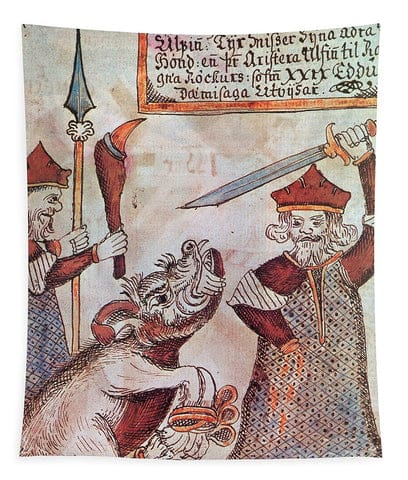Your Cart is Empty
Menu
-
- Shop by Type
- End of Line Sale Items
- New In
- Viking Gifts Under $30
- Hand Forged Axes
- Silver Viking Jewelry
- Stainless Steel Jewelry
- Cremation Jewelry
- Necklaces and Pendants
- Hand Carved Wooden Pendants
- Kings Chains
- Viking Drinking Horns
- Pendant Chains
- Rings
- Bracelets
- Earrings
- Beard Beads and Beard Rings
- Collectables
- Ceramic Mugs
- Street Wear
- Horn Jewelry
- Bronze and Pewter Jewelry
- Shop by Theme
- Viking Axe
- Celtic Jewelry
- Dragon or Serpent
- Viking Raven
- Wolf / Fenrir
- Rune Jewelry
- Odin Jewelry
- Ram / Goat
- Shieldmaidens / Lagertha
- Sword, Spear or Arrow
- Thor's Hammer / Mjolnir
- Tree of Life / Yggdrasil
- Helm of Awe / Aegishjalmur
- Triquetra or Triskelion
- Valknut / Knot of Slain
- Vegvisir / Viking Compass
- Veles / Bear
- Blogs
- Help
-
- Login

The God Tyr and the Tiwaz Rune

Tyr (pronounced like the English word 'tier') was the Norse god of war, law and justice and alongside Odin and Thor, was one of the most important of the Norse and Viking gods.
Tyr came into Norse culture via his existence as a Germanic deity, but prior to that the Romans identified Tyr with Mars, the Roman god of war. His importance in both Roman and Germanic culture can be attested by the use of his name for the letter 'T' of the runic alphabet and for the day of the week Tuesday which came from the Old English 'Day of Tiw (Tyr)'.
The most notable characteristic of Tyr was his missing right hand that is traditionally shown as missing from the wrist or forearm downwards as a result of a bite from the wolf Fenrir.

The story of how Tyr lost his hand can be found in 'The Blinding of Fenrir' from the Poetic Edda (the only myth to feature Tyr prominently). In this story Fenrir (one of three offspring from Loki and Angrboda) was so feared that he was kept in Asgard for safe keeping.
The story has it that Fenrir grew so powerful that the gods thought it wise to keep him in chains. Each time Fenrir broke free of his chains, they were able to replace them with stronger ones by persuading Fenrir that each stronger chain was a new test of his strength.
Eventually the gods called on the dwarves to forge a new super-strong chain. The dwarves made this chain from things which didn't exist like roots from mountains and was called Gleipnir or 'Open' because it was futile to struggle against it.
When the gods attempted to tie Fenrir with the new chain, he was suspicious because it was so light and he refused to be bound by it unless one of the gods laid their hand in his jaws. Tyr was the only one willing to agree to Fenrir's demands and needless to say, when Fenrir realised he couldn't escape from his new chain, he tore Tyr's arm off.
This story helps to explain the slightly contradictory notion that a god of war can also be a god of justice and law. The gods swore an oath to Fenrir and Tyr's selfless actions ensured that not only were the gods ultimately saved from Fenrir but that the oath was honored despite coming at great personal cost (a warrior with one arm is no longer much of a warrior).
The Tiwaz rune is represented as an arrow pointing northwards and as a reflection of Tyr's life, it represents the sacrifice of the self for the good of all.
The belief that courage and a right cause carries the day is governed by Tiwaz. It is the common justice of the people rather than the use of law by tyrants (a word that uses Tyr as a root).

A great selection of items containing runes from the Elder Futhark, including the Tiwaz rune can be found here - Viking Rune Jewelry
